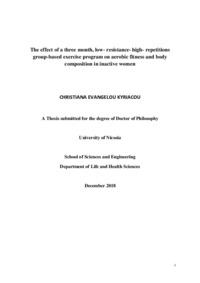- Evangelou Kyriacou, Christiana
- Department of Life and Health Sciences
- December 2018
- English
- 119 pages
- Giannaki, Christoforos
- Βody Composition | Depression | Physical Fitness | Low Resistance Program
- BMI -- Physical Fitness for women
- Original: Unic - Rules: RDA
-
-
Various factors contribute to the high obesity rates observed worldwide including physical inactivity, sedentary lifestyle and impaired sleep quality. The current PhD project consisted by two studies: a cross sectional study and an interventional study. The aim of the cross-sectional study was to examine the association among physical fitness, body composition, depression, fatigue and sleep quality among a sample of adult women (36.1 ± 11.7 yrs) with different obesity status. One hundred and ninety one volunteer adult healthy women participated in this cross-sectional study and were divided as follows: normal body weight (BMI 18.5-24.5kg m²), overweight (BMI 25-30 kg/m²) and obese (BMI ≥ 30). Obese women were observed to experience significantly worse score in depression (p<0.05).
Similarly, the obese and overweight women were found to exhibit lower levels of aerobic fitness compared to women with normal BMI (p<0.05). Body composition parameters were shown to be inversely associated with low score on both physical fitness tests as well as with poor sleep, depression and fatigue levels (p<0.05). Depressive symptoms and performance on various physical fitness tests were found to be significantly impaired in obese and overweight adult women indicating the negative impact of increased body weight in overall health and wellbeing.
The aim of the intervention study was to examine the effects of a three month, low resistance, high repetition (LRHR) group fitness program on aerobic fitness and compare results obtained, with a Pilate’s program.
Twenty six adult women were assigned in the LRHR program, whereas sixteen women in the Pilates. Aerobic fitness, as well as lower extremities explosive power and body composition parameters were significantly improved in women of the LRHR group compared to the Pilates group (p<0.05). On the other hand, the Pilates group, as expected, showed a significant increase in scores related to flexibility (p<0.05). In summary, LRHR group fitness programs can be well tolerated by unfit women of the general population and could be used as an alternative method to the traditional cardiorespiratory exercise training in terms of improving physical fitness and body composition.
Taking all into account, the current PhD thesis highlights the negative impact of obesity in aspects related to physical and mental health and wellbeing in adult women, whilst participation in a low resistance and high repetition exercise regimes for 3 months could result in significant improvements in fitness and health related parameters.
-
The effect of a three month, low- resistance- high- repetitions group-based exercise program on aerobic fitness and body composition in inactive women
Main Files
 Full text
Full text
Description: Evangelou PhD thesis_Exercise Sciences and Physical Education.pdf (pdf) Book Reader
Size: 0.8 MB

